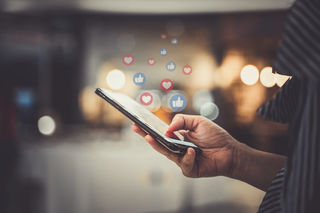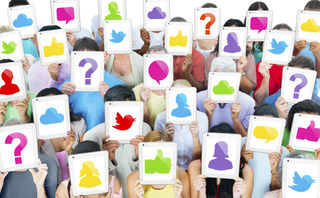Media
Tired of Feeling Like You Don't Measure Up?
Tips for feeling "good enough" in a world of social media comparisons.
Posted August 2, 2019 Reviewed by Devon Frye

Let's face it—comparing yourself to others is a losing battle. Whether you're doing this in real-time or on social media, judging yourself for the ways that you are "different" often results in feeling "not good enough."
As an out-of-the-box thinker, you've likely already received many negative messages throughout your life about what you can do differently or "better." Social media, with its system of likes and comments, can easily plunge you further into a low self-esteem spiral. How can you manage to hold onto your positive views of yourself and your life? How can you value these insights as equally valuable—if not more valuable—as what others say?
It's challenging enough to live with ADHD. You probably already struggle with organization, motivation, impulse control, and working memory, among other executive functioning skills. Hopefully, you're beginning to accept the brain you have: to feel good about your innate strengths and talents and become willing to improve your challenges (without blaming yourself for having them). Social media, with its dopamine rush of pings for every like, comment, and share, can become addictive for all of us. Folks living with ADHD, who have naturally lower amounts of dopamine, are especially susceptible to these rushes.
Research conducted for a 2017 HuffPost article showed that "60 percent of people using social media reported that it has impacted their self-esteem in a negative way; 50 percent reported social media having negative effects on their relationships; 80 percent reported that is easier to be deceived by others through their sharing on social media." Apps like Instagram and Snapchat function mainly by showing only the most superficial aspects of people.
The majority of pictures posted by teens and young adults seem to be photos of friends at parties, concerts, sporting events, etc.—having fun or showing an idealized version of themselves. These postings allow people to control the way they present information about their lives. A 17-year-old girl recently told me: "No one ever posts pictures of their face mid-menstrual break-out or of their bombed test grade. As a result, the observer is led to a series of conclusions: 1) look at how great so and so’s life is; 2) I wish mine was more like theirs; 3) I suck.”

What can you do to remind yourself that you don't "suck"?
1. Actively tell yourself that what you see on social media isn't the full story.
It's very important that you remind yourself that people post what they want you to see, not necessarily what really happened or what they feel about what happened.
Think about what you post. Are you sharing your disappointments or embarrassments? Probably not. You're not seeing the real insecurities, struggles, or frustrations that people are dealing with—just like you are.
Tip: Remind yourself of the ways you are managing and succeeding in living with ADHD now that are different than a year ago. Write them down. You'll see the progress you made!
2. Stop using followers or likes as measures of value.
How many people follow or like you on social media tells you nothing about your value as a person and usually results in the lowering of your self-worth.
Do you have friends you trust, like to be around, and who offer you support? Do you have activities or interests that you enjoy and are good at? These are the things that contribute to healthy self-esteem and good living. Social media metrics don't help you make good decisions or nurture genuine resilience.
Tip: Make a list of what you're good at and what activities bring you happiness. Write this down and hang it in your room. It sounds corny, but many folks with ADHD need these visual reminders—and I bet you do, too.
3. Limit the times when you check your email, Instagram, Snapchat, etc.
Most successful CEOs check their email and/or social media at specific times during the day for limited periods of time. So much of social media scrolling is related to FOMO. This means that you are not participating in your life, but are spending time looking at how other people are focused on theirs.

Tip: How can you change your perspective and your habits? Decide how many times per day you really want to be on social media. Then, mark a time in your daily schedule for these and set alerts for start and end times. Reward yourself with something that you like to do when you are finished so you can actually get off-line. Breaks from social media can restore you physically, mentally, and emotionally.
You are so much more than the number of follower and likes. Focusing on these numbers isn't sustainable for healthy, happy living. Shift your focus and start valuing yourself today!
References
Silva, Clarissa. “Social Media's Impact On Self-Esteem.” The Huffington Post, TheHuffingtonPost.com, 22 Feb. 2017, www.huffingtonpost.com/entry/social-medias-impact-on-self-esteem_us_58a….




